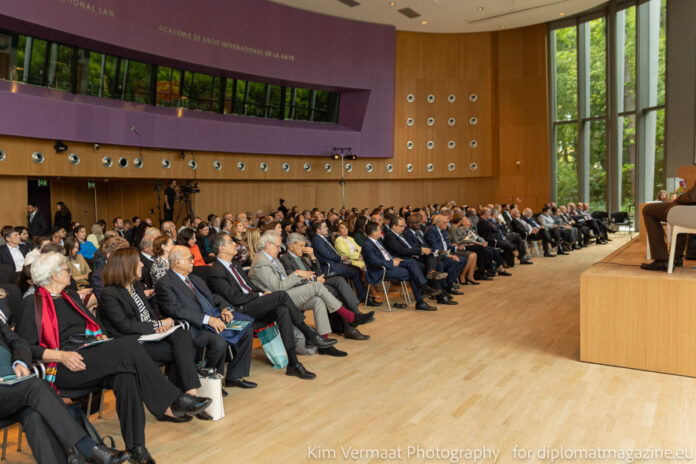By Steven van Hoogstraten, Former Treasurer Hague Academy
During the last week of May the Hague Academy of International Law (first courses in 1923) celebrated its Centenary. A festive program was held in the premises of the Academy in the new wing of the Peace Palace.
The important moment itself was marked with a solemn sitting on Wednesday, with speeches by the President of the Curatorium, the French professor and judge Yves Daudet, and the chair of the Conseil d’Administration Minister of State, Piet Hein Donner. The Mayor of The Hague, Jan van Zanen emphasized the continued welcome for the Hague Academy in the City of Peace and Justice. The representative of the Ministry of Foreign Affairs, Dominique Kühling (Head of Protocol), complimented the Academy, while staying close to the response to the international situation with a war once again going on on European soil.
The scientific colloquium on 25/26 May was the more substantive part of the commemoration of one century of high level teaching and study of international law. Many famous legal professors and experts had travelled to The Hague to be part of this impressive program, under the title “Challenges of International Law at the time of the Centenary of the Hague Academy”.
The Hague Academy was in fact conceived – with the active support of Tobias Asser – during the second Peace Conference in the Hague in 1907, and was ready to start in October 1914. Unfortunately the Great War (WW1) intervened, so the first courses could only be held in the Peace Palace in 1923. The Academy has been famous for its world wide appeal, due in large measure to the excellence of the professors and of the students. “The best professors for the best students” is an underlying thought of this classic Academy. Admission is open to students who are in their last year of formation.

In these days, the Hague Academy attracts some 600 students from more than 100 nations to its summer courses, and 300 to the newly added winter courses. All the scientific contributions, particularly the lectures by the professors and the result of the reserach centers, are being published in the globally famous “Recueil des Cours”. This series is distributed world wide by publisher BRILL Nijhoff, both in print and also online. It is a great source of international legal thinking covering the perspectives on international law from all corners of the globe in both private international law and public international law. Not less than 430 volumes have as yet appeared. These scripts can be consulted in many of the law libraries around the world and are widely quoted, both in academic literature and in decisions of international courts and tribunals.
Highlights of the Centenary program were, just to name a few, themes like “the humanization of international law”, “the law applicable to international (investment) arbitration” and “should and can extraterritoriality be contained ? “. More down to earth were themes like “can international law help facing epidemics, or “Should and can, global finance be submitted to internartional law “? Many lively debates could be heard , by the best in the field, including the judges of ICJ who often were professors of international law and are sometimes elected to the Curatorium like former ICJ president Peter Tomka, judge Mohamed Bennouna (Morocco) and judge Hillary Charlesworth (Australia).
The Hague Academy of International Law is well known in the world, probably more so than in the Netherlands. The General Assembly of the UN annually calls upon States to support this grand old institution for the study, teaching and and dissemination of international law.
Over the years many States – at one point over 40 – have followed up on this call and made available some funding, in order to keep access to the courses as open as possible, notably for students from developing countries.
In this respect, the Hague Academy of International Law operates a succesful system of scholarships which are meant to reach those students who are best qualified to participate but lack the means to do so.
In the new Century ahead of it, the Academy will not only stick to its traditions like being bilingual in French and English, but it will also try to innovate and engage with modern issues. One of these will no doubt be international criminal law, which happened to find itself at the forefront of several current debates. Not in the least because of the ongoing war in Ukraine, an aggression that goes against the fundamental principles of international law.



